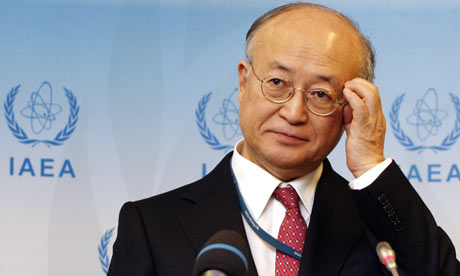
Yukiya Amano at a press conference in Vienna today. Photograph: AFP/Getty Images
Yukiya Amano, addressing the first meeting of the board of the International Atomic Energy Agency (IAEA) since he took over as director-general, said he was unable to confirm that Tehran was engaged solely in peaceful nuclear activities "because Iran has not provided the agency with the necessary co-operation".
Iran immediately rejected the charge. "We have always welcomed and encouraged negotiations and talks," said its foreign minister, Manuchehr Mottaki, during a visit to Geneva.
The exchange came as the United States and Britain orchestrate support for new United Nations action against Iran for its failure to cease uranium enrichment. Russia has moved towards the western position in recent weeks, while diplomatic efforts are focusing on persuading China ‑ one of the veto-wielding "permanent five" members of the security council ‑ to back a new resolution.
Israeli officials said today they were optimistic that China would not use its veto after hearing Israeli arguments about the dangers of a nuclear-armed Iran. Israel ‑ which unlike Iran has never signed the nuclear non-proliferation treaty ‑ is the only nuclear power in the Middle East.
Amano, a Japanese disarmament expert, came under fire last month when he suggested Iran was trying to develop a nuclear-armed missile, fuelling fears in Tehran that he was taking a tougher line than his Egyptian predecessor, Mohamed ElBaradei.
The first report produced during Amano's term used unusually blunt language to confirm that Iran had produced its first batch of uranium enriched to a higher purity — 20% — but said the Islamic Republic had failed to give inspectors the required advance notice. It also referred to the possible existence of past or current undisclosed activities related to the development of a nuclear payload for a missile.
International attitudes to Iran hardened last autumn after it revealed a previously unknown nuclear facility in the mountains near Qom, apparently to pre-empt exposure by the United States.
Tehran insists its nuclear programme is solely for peaceful purposes.

No comments:
Post a Comment